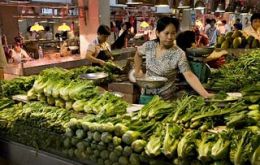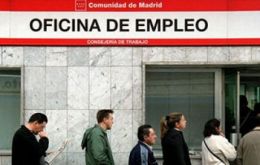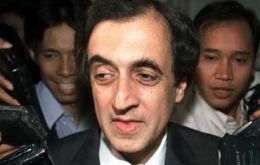MercoPress. South Atlantic News Agency
Economy
-
Friday, October 14th 2011 - 22:00 UTC
September inflation in China eased but high prices for food remain a concern

Inflation in China eased slightly in September but high prices, especially for food, remain a concern for the country's population. Consumer prices rose 6.1% last month, compared with the same month last year, the National Bureau of Statistics said.
-
Friday, October 14th 2011 - 07:41 UTC
Brazil sets tough rules for three airport terminals concessions

Operators interested in running Brazil's largest airport will be required to make a minimum bid of 1.3 billion dollars, Brazil's aviation authority said on Thursday.
-
Friday, October 14th 2011 - 03:21 UTC
Argentina agrees to dredge a River Plate access canal, crucial for Uruguayan ports

Uruguay and Argentina approved this week conditions to begin dredging the River Plate Martin Garcia access channel, an ongoing dispute of over ten years that seriously constrained Uruguay’s ports development, according to reports in the Montevideo media.
-
Friday, October 14th 2011 - 03:12 UTC
Uruguay forecasted to expand 5.5% this year and 4.5% in 2012

The Uruguayan economy is forecasted to expand 5.5% this year generating 40.000 new jobs, and 4.5% in 2012, according to “Prospects and Tendencies” announced Thursday by the Economy Institute from the Economics Faculty.
-
Friday, October 14th 2011 - 02:58 UTC
S&P downgrades Spain’s credit rating on incomplete labour market reforms

Ratings agency Standard and Poor's downgraded the long-term credit rating of Spain by one notch, knocking the Euro down by a third of US cent as it followed hard on the heels of a similar downgrade by Fitch last week.
-
Thursday, October 13th 2011 - 23:41 UTC
IMF says China can partially offset the impact of a global crisis

China has the scope to respond if global economic risks materialize, and the country's response could partially but not entirely offset the impact of a global crisis, the International Monetary Fund's Asia and Pacific director said on Thursday.
-
Thursday, October 13th 2011 - 23:23 UTC
Argentine ‘Congress inflation’ in August reached 1.89%, double the official index

Argentine opposition members of the Lower House released on Thursday the dissident inflation rate (‘Congress index’) for October. The index, which was set at 1.89%, is based on reports delivered by some private consultants, which differ substantially from that release by the INDEC Statistics Bureau Agency.
-
Thursday, October 13th 2011 - 23:20 UTC
Fed’s 10-member split in three on stimulus measures, reveal minutes

Three members of the Federal Reserve's Open Market Committee (FOMC) voted against the Fed's latest stimulus measures at its meeting last month, minutes have revealed.
-
Thursday, October 13th 2011 - 23:14 UTC
German banks fear tough EU recapitalization standards could backfire

Germany's banks have said that they should not be pushed to increase their financial cushions beyond existing law under the European Union's effort to shore up the financial system against the debt crisis.
-
Thursday, October 13th 2011 - 07:53 UTC
Uruguayan First Lady described Vazquez ‘war hypotheses as absurd and a kids’ anecdote

Uruguay’s First Lady Lucia Topolansky described statements from former president Tabare Vazquez referred to a possible ‘war hypotheses’ with Argentina over the paper mill conflict as ‘absurd’ and recommended those words shouldn’t be considered more than a simple kids’ anecdote.
